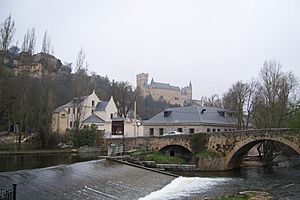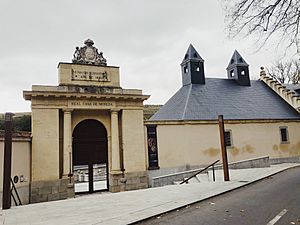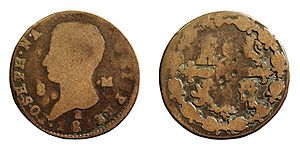The Coining House, Segovia facts for kids

The Coining House in Segovia, Spain, was once a royal factory where coins were made. It was built a long time ago, in the 1500s! Today, it's a cool museum. You can learn all about old coins, how factories used to work, and even about Segovia's famous aqueduct.
Contents
History of the Royal Mint
How Coins Were Made
King Philip II ordered this special coin factory to be built around 1580. He knew about a new way to make coins using machines. These machines were powered by water wheels, which was a very modern idea back then! This method was already being used in other parts of Europe. A person named Archduke Ferdinand of Tyrol helped the king get all the necessary equipment. This made the Coining House the very first factory in Spain to use machines for production.
Building the Factory
In 1582, a group of experts from Austria traveled to Spain. Their job was to find the perfect spot for the new factory and its machines. They chose a property next to the Eresma River that used to grind grain and make paper. Building the new factory started on November 7, 1583. The plans were drawn by Juan de Herrera, who was a very famous Spanish architect at the time. Herrera, the king, and the German engineers all met at the old mill to plan everything out.
Changes Over Time
The technology used to make coins got even better in the 1700s. They started using a new type of machine called a flywheel press.
During the wars with Napoleon, the factory was controlled by Joseph Bonaparte. After that, coins were made for King Fernando VII and the kings and queens who came after him. The very last coins were made here in 1869, during the time of Queen Isabel II.
Architecture and Design
Who Designed It?
The Coining House was built in the 1500s for King Philip II. One of Spain's most important architects, Juan Herrera, designed it. He worked with a group of experts from Tyrol to create the first plans. The building has stayed mostly the same since then.
Location and Restoration
This old factory is located between the Eresma River and a place called The Garden of Poets. After it stopped making coins in 1968, the building started to fall apart. A big project to fix it up began in 1998. The actual work to restore it happened between 2007 and 2011.
The Coining House Today
From Factory to Museum
After 1878, the building was sold and turned into a flour factory. It made flour until November 1967. After that, the building was left empty for a while. In 1989, the city of Segovia bought it. The big renovation project started on February 14, 2007. Today, the Royal Mill Mint is considered a very important historical site. It's one of the oldest industrial buildings still standing in the world!
See also
 In Spanish: Real Casa de la Moneda (Segovia) para niños
In Spanish: Real Casa de la Moneda (Segovia) para niños
 | Stephanie Wilson |
 | Charles Bolden |
 | Ronald McNair |
 | Frederick D. Gregory |



